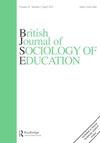复杂的反身性:女性正式教授在新自由主义学术界的实践
IF 2.1
3区 教育学
Q1 EDUCATION & EDUCATIONAL RESEARCH
引用次数: 2
摘要
摘要本文在性别化和新自由主义的背景下考察了女性正式教授的案例,提出了复杂反身性的概念。这个概念指的是一种内部对话,说明了人们思考其模糊性和矛盾性的实际方式。本文介绍了一些女教授在体制结构方面的具体经验和做法。这项研究基于2018年11月至2020年12月期间进行的实地调查,其中包括对24名教授的采访,以及一项民族志研究。他们复杂的自反性结合了适应不稳定的条件、重建(获得资源的不同寻常的方式)、感受同龄人的嫉妒,同时还要处理行政事务、减少专门用于学术任务的时间,以及培养关爱和谨慎的做法。通过他们的行动,教授们克服了大学中的缺点和冲突,但他们也改变了这些所谓的不可改变的条件。本文章由计算机程序翻译,如有差异,请以英文原文为准。
Complex reflexivity: practices of women full professors in neoliberalised academia
Abstract This article examines the case of women full professors in a gendered and neoliberalised context to propose the concept of complex reflexivity. This concept refers to an internal conversation and accounts for the practical way in which people may ponder their ambiguities and contradictions. This paper presents the concrete experiences and practices of some women professors in relation to the institutional structure. The research is based on fieldwork conducted between November 2018 and December 2020, which includes interviews with 24 professors, as well as an ethnographic study. Their complex reflexivity combines adapting to the precarious conditions, rebuscar (unusual ways of getting resources), perceiving envy from their peers, and, at the same time, dealing with the administration, reducing the time dedicated to academic tasks, and developing caring and careful practices. With their actions, the professors navigate the shortcomings and conflicts in the university, but they also modify these supposedly immovable conditions.
求助全文
通过发布文献求助,成功后即可免费获取论文全文。
去求助
来源期刊
CiteScore
3.70
自引率
9.50%
发文量
74
期刊介绍:
British Journal of Sociology of Education is one of the most renowned international scholarly journals in the field. The journal publishes high quality original, theoretically informed analyses of the relationship between education and society, and has an outstanding record of addressing major global debates about the social significance and impact of educational policy, provision, processes and practice in many countries around the world. The journal engages with a diverse range of contemporary and emergent social theories along with a wide range of methodological approaches. Articles investigate the discursive politics of education, social stratification and mobility, the social dimensions of all aspects of pedagogy and the curriculum, and the experiences of all those involved, from the most privileged to the most disadvantaged. The vitality of the journal is sustained by its commitment to offer independent, critical evaluations of the ways in which education interfaces with local, national, regional and global developments, contexts and agendas in all phases of formal and informal education. Contributions are expected to take into account the wide international readership of British Journal of Sociology of Education, and exhibit knowledge of previously published articles in the field. Submissions should be well located within sociological theory, and should not only be rigorous and reflexive methodologically, but also offer original insights to educational problems and or perspectives.

 求助内容:
求助内容: 应助结果提醒方式:
应助结果提醒方式:


